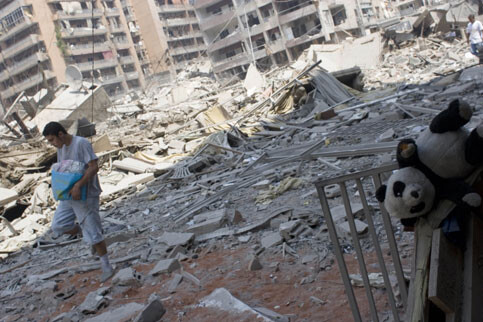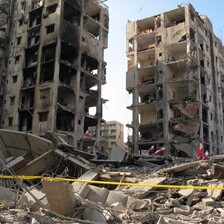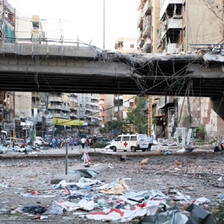Beirut 24 July 2006

A general view of a demolished area in the Lebanese capital of Beirut, 23 July 2006. Israeli air strikes have destroyed much of Lebanon’s infrastructure and transport network. (MaanImages/Raoul Kramer)
Two days ago, sitting on my sister’s balcony in Achrafieh, I saw an American helicopter. Well, I heard it first. I followed my ears with my eyes. There it was in the sky, making slow, calculated progress. My brother-in-law, Hasan, explained to me what type of helicopter it was. It had two sets of spinning metal blades. Both sets of blades were chopping into the air furiously, loudly and indiscriminately, in order to keep itself afloat. I had seen this type of chopper before, flying over Baghdad three years ago, again in July. At the time, watching the helicopter from a high up balcony in a residential building that overlooked the Tigris River, I reached for a 8mm film camera to record its image with. Funny how memory works. One war reminds you of another.
In Beirut, the helicopter was just another piece of US made war machinery cutting through the sky in Lebanon. There are many of those around here. While the United States government will not support a unilateral cease-fire, it does negotiate enough to move its citizens confidently through a “safe corridor” across the sky in these military helicopters, transporting them from the US Embassy to a US chartered boat. The overconfident noise of the metal announces their departure, just as the sonic boom of the F-16 heralds the arrival of the IDF every day and night.
Sometimes the F-16s drop bombs. Sometimes they do not. They fly across the country incessantly - sometimes slowly - taunting us with our own helplessness. The body, despite itself, becomes fluent in the language of violence. The ears begin to decipher which sound belongs to which type of artillery shell, the feet detect which vibrations denote bombings from the sky or the earth, and the brain quickly calculates how far away the explosions are, based on how strongly the glass shakes in your home or car. Of course, as soon as your muscles relax with the knowledge that the Israelis are “only” breaking the sound barrier, a real bomb explodes. Somebody, somewhere, dies.
Soon, the remaining foreigners and bi-nationals that are evacuating will have left the country - by sea and by air. Once they are gone, the hypothesis is that Israel will feel “freer” in their targeting. Without the presence of those who carry foreign passports who either want to leave (there are many, myself included, who will not evacuate for various reasons) or cannot afford not to leave, the country will become even more seductive to Israel’s war machine. Exposed. Alluring. Vulnerable.
Once emptied of these class “A” human beings, the rest of us, those who have not or cannot leave - Lebanese but also Palestinian, Syrian, Sri Lankan, Ethiopian, Filipino - will re-learn the bitter lesson that human lives are not valued equally. Israel will not be above “missing” a little (more). How many (more) times will we, Arabs, Africans, South East Asians, and other members of the Global South, be forced to accept that our lives are cheaper, and can be purchased at wholesale, collateral prices?
Already, there are parts of Lebanon, particularly in the southern half of the country, that are flattened. What was vertical is now horizontal. Row upon row of residential buildings have been bombed, their internal organs - twisted metal and concrete - spread across the ground. Here and there, hints of the lives they used to shelter. A lonely shoe, a cooking pot, a photo album. There are dead bodies now trapped under these memories of life.
Of course, all of this has been “tactical,” “surgical,” and “precise.” In Lebanon, as in Palestine and Iraq, even adjectives have been turned into weapons.
Related Links
Maya Mikdashi is a graduate student at Columbia University and a documentary filmmaker, currently working with Quilting Point Productions.





